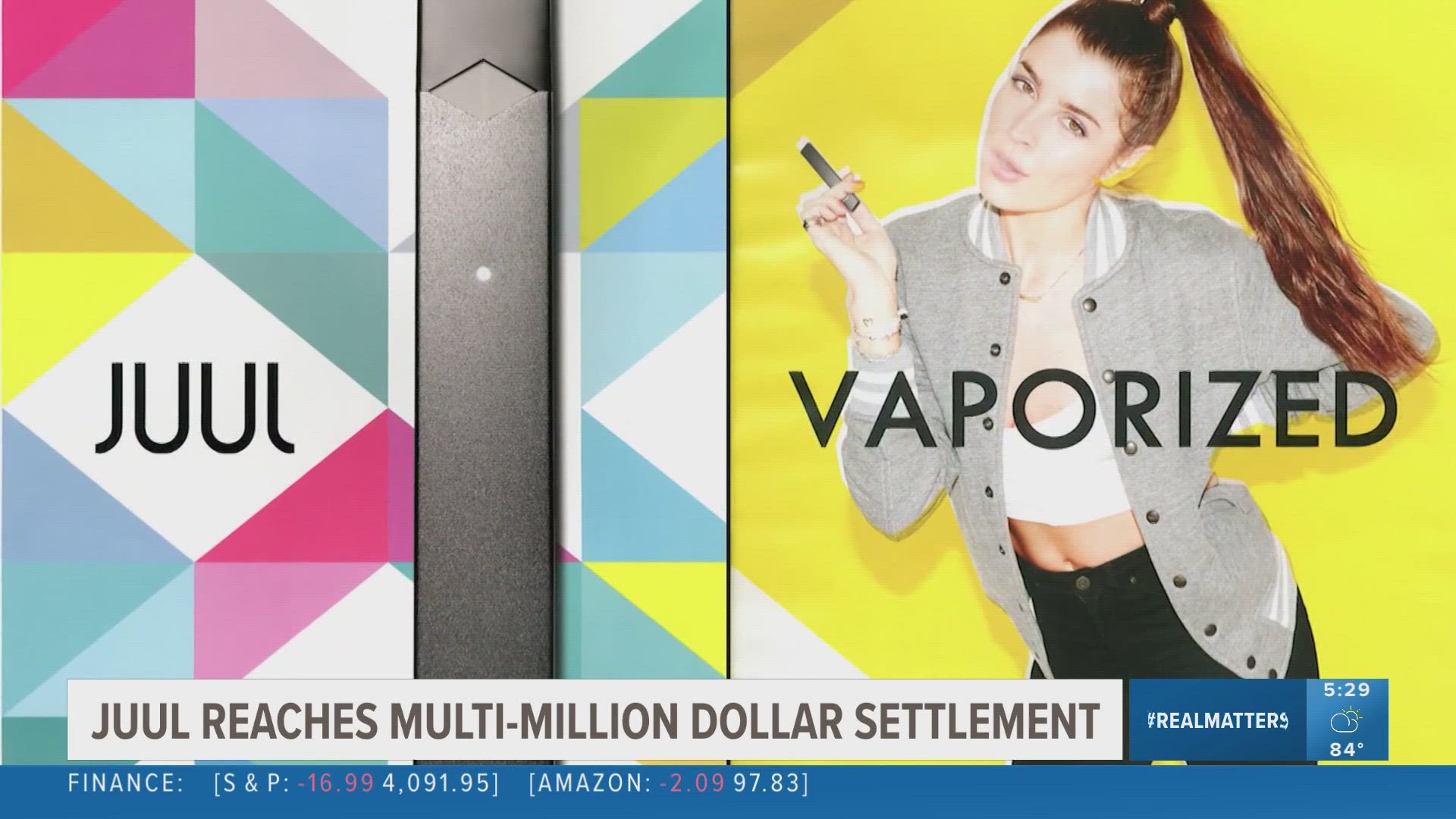WASHINGTON — Electronic cigarette company Juul Labs will pay $15.2 million to the District to resolve allegations that it marketed nicotine products to the city's youth and misled District consumers about the product’s highly-addictive qualities. The settlement is part of a $462 million agreement with six states and the District for "causing a nationwide youth vaping epidemic."
“Juul preyed on children for profit, implementing an intentionally deceptive, manipulative marketing campaign targeting underage users with the intention of creating addicted customers,” Schwalb said. “JUUL knew how addictive and dangerous its products were and actively tried to cover up that medical truth."
New York Attorney General Letitia James said it is the largest multistate settlement with JUUL and included California, Colorado, Illinois, Massachusetts, New Mexico and New York, as well as the District.
"The Office of the Attorney General prioritizes protecting District children’s health and safety and ensuring our kids can live healthy, hopeful lives," Scwalb said. "Now, thanks to the diligent work by our legal teams, Juul has ended its harmful, illegal conduct and must put millions of dollars towards mitigating the public health damage it caused.”
Over the last several years, the U.S. Food and Drug Administration (FDA) and the surgeon general have warned that the country is in the midst of a teenage vaping epidemic. Usage levels are spiking at an unprecedented rate, reversing a decades-long decline in smoking rates among young people. According to the FDA and the surgeon general, in 2018 3.6 million kids in the United States used e-cigarettes, including one in five high school students.
In November 2019, the DC Office of the Attorney General filed a lawsuit alleging that Juul deliberately targeted underage consumers; failed to verify ages of purchasers; and deceived consumers about the content, strength and safety of its products.
Wednesday, Juul said the settlement was part of its effort to combat underage tobacco use and move the company forward on sold footing.
“With this settlement, we are nearing total resolution of the company’s historical legal challenges and securing certainty for our future,” a company spokesperson wrote in an email to WUSA9. “We have now settled with 47 states and territories, providing over $1 billion to participating states, in addition to our global resolution of the U.S. private litigation. Since our company-wide reset in the fall of 2019, underage use of Juul products has declined by 95% based on the National Youth Tobacco Survey.”
Schwalb’s office said at least 50% of the settlement amount will be used directly to mitigate the public health damages Juul’s products caused, including:
- Programs that provide cessation assistance to District residents who were exposed to any Electronic Nicotine Delivery System (ENDS) while under the age of 21
- Education or prevention programs that are designed to prevent or reduce use of ENDS by District residents who are under the age of 21
- Research in support of preventing ENDS use by District residents who are under the age of 21 by independent third parties
- Research into the health effects, whether short, medium, or long-term, of the use of ENDS by persons, including persons under the age of 21
- Programs or equipment that are designed to abate the impact that ENDS and other nicotine products have had on District students, schools, school districts and to prevent such impact in the future
- Efforts to mitigate the impact of, including by enforcing District law with respect to, disposable ENDS, nicotine products, and companies that have not taken steps similar to those described in this settlement agreement to limit access to or usage of nicotine products by District residents who are under the age of 21
- Additional consumer investigation, enforcement, and education efforts; and reimbursement for the costs of the investigation and litigation, including attorney's fees
As a result of OAG’s investigation and lawsuit, Juul must abide by strict advertising restrictions which include:
- Prohibitions on advertising in social media channels or influencers used by youth, on billboards and public transportation, and on using representations of anyone under the age of 35 in advertising
- Stringent ID verification and adult signature requirements for online purchases on Juul’s website
- Restrictions on comparisons to tobacco products unless authorized by the FDA
- Disclosure of nicotine content in milligrams and as a percentage of total volume
- Limitations on bulk online and in-person purchases
- Restrictions on low-cost promotional giveaways of Juul products
- A retailer compliance “secret shopper” program and penalties for failure
- A depository of publicly available documents for further research, paid for by Juul
To ensure compliance with the above terms, Juul must designate and maintain a compliance officer, who shall be a corporate senior-level employee responsible for ensuring compliance with this Consent Judgment and shall act as a point of contact with OAG to address any compliance-related issues.
The Juul spokesperson told WUSA9 the company would comply with the terms of the agreement.
“Now we are positioned to dedicate even greater focus on our path forward to maximize the value and impact of our product technology and scientific foundation," the spokesperson wrote in his email. "Our priorities remain to secure authorization of our PMTAs based on the science and lead the category with innovation to accelerate our mission and advance tobacco harm reduction for over 31 million adult smokers in the U.S. and over 1 billion adult smokers worldwide.“
A copy of the settlement agreement is available here.

